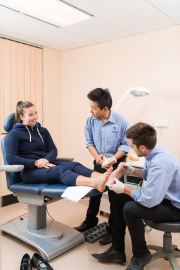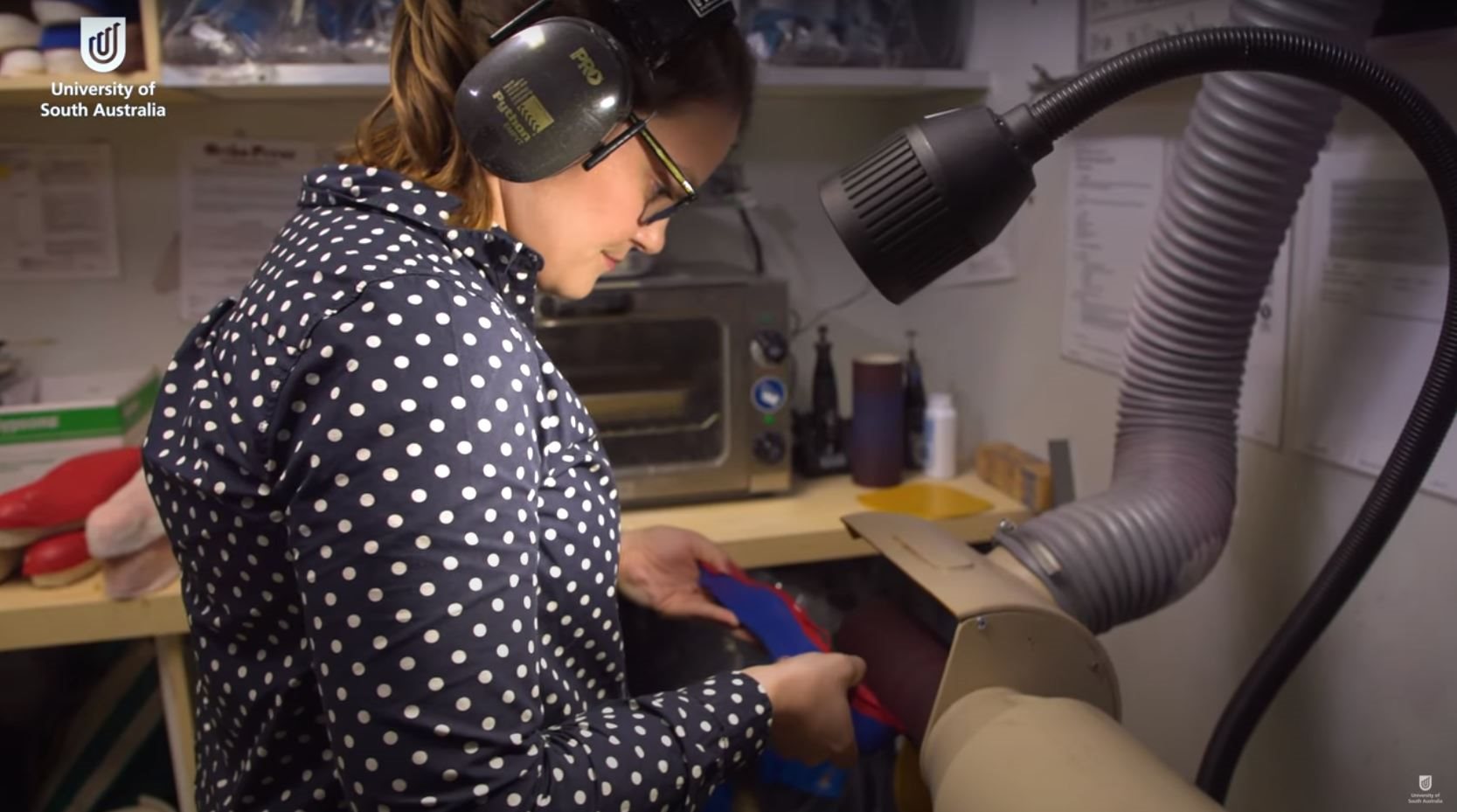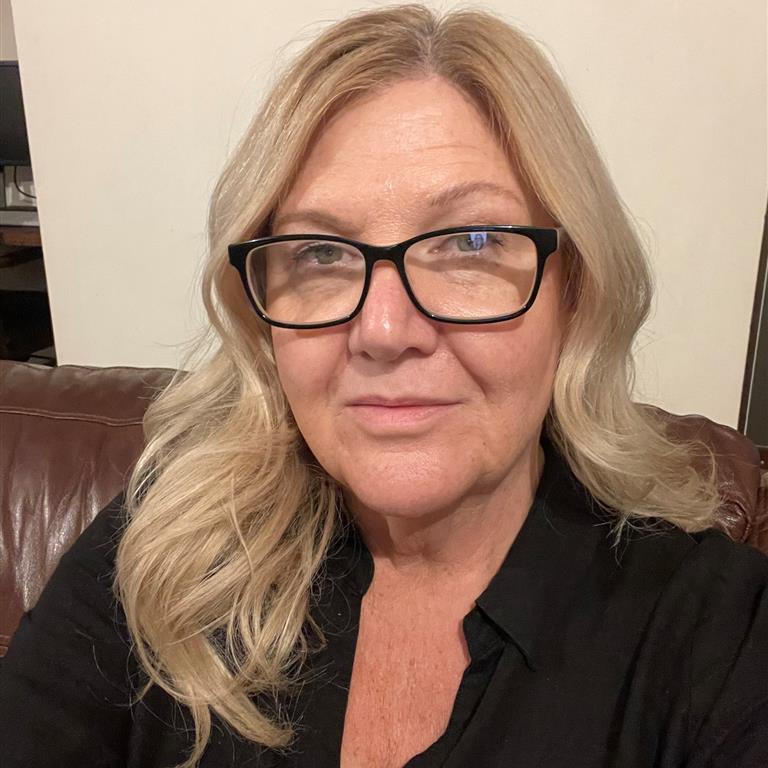Bachelor of Podiatry
Degree Level Undergraduate
Year 2025
You're considered an Australian student if you are any of the following:
Degree Level Undergraduate
Year 2025
Prerequisites
None
Assumed Knowledge
SACE Stage 2 Biology
SACE Stage 2 Chemistry
More info
Admissions
Student Profile
Entry Scores
2025 Guaranteed Entry
Year 12 (ATAR-based): 87.00
Year 12 (Grades-based): A,A,A
TAFE/RTO: AdvDIP
TAFE/RTO Note: Cert IV in Aboriginal and Torres Strait Islander Primary Health Care (Aborginal applicants only)
View Guaranteed Entry Info
2024 Cut-Offs
Year 12 (ATAR-based):
- Internal: 80.00
TAFE/RTO: Adv Dip
View full entry requirements
The admission criteria have been grouped to assist you to easily find the information most relevant to your circumstances. However, you may fit into more than one and the university will consider applicants against each of the relevant criteria.
Certain conditions apply. For more information refer to Appendix 4 of the University's Selection and Entry policy.
Applicants are required to meet one of the following criteria with a competitive result, and demonstrate that they fulfil any prerequisite requirements and essential requirements for admission:
Recent secondary education
Meet any prerequisite requirements with a minimum grade of C- or equivalent
AND
Applicants who have not achieved the Selection Rank required for automatic selection may be selected for any remaining places based on the grades of their year 12 subjects.
OR
Higher education study
OR
Vocational Education and Training (VET)
OR
Work and life experience

Step into a rewarding career in health by studying the Bachelor of Podiatry. In this four-year degree, you’ll develop the expertise to diagnose, manage and treat any disorders affecting the foot, ankle and lower limb, using multiple branches of healthcare.
Feet are complex and sensitive pieces of machinery that play a key role in the body’s overall health. Podiatrists provide end-to-end care for any afflictions impacting the lower half of your body, ranging from managing bone and joint disorders to neurological and circulatory diseases.
You’ll graduate ready to be registered with the Podiatry Board of Australia, and can begin practising as an allied health professional. Pursue careers in a wide range of environments, such as working with children, sports and biomechanics, disability, rehabilitation, aged care, chronic illness and high-risk settings, and more.
High achieving students may be considered for the Bachelor of Podiatry (Honours) during their third year of study. This is your opportunity to advance your research capacity by completing a research project under the supervision of an experienced researcher.
Students who undertake activities where interaction with patients/the public is required for their degree, such as field or clinical placements/visits and in University clinics and gyms, must demonstrate they meet mandatory pre-placement conditional requirements. These include criminal history clearance, child related employment clearance and immunisation requirements.
Please visit the Clinical Placement Unit for information on key requirements, and to access the full student checklists.
All students enrolled in a program leading to professional registration must be registered with the relevant national board. The registration process is undertaken by the Australian Health Practitioner Regulation Agency (AHPRA) with the University providing notification to AHPRA following enrolment in the program.

The Bachelor of Podiatry will teach you the skills to diagnose, manage and treat any disorders affecting the foot, ankle and lower limb. You’ll learn advanced skills in the theoretical and practical aspects of podiatry, as well as the physical, biological and social sciences relevant to allied health to provide patient-centred, end-to-end care.
UniSA's curriculum prepares you to meet the full scope of a podiatrist’s practice. You’ll begin studying foundational medical sciences in areas including anatomy, physiology, biomechanics, disease groups and conditions. You’ll also learn determinants of health and advanced communication skills, with opportunities to collaborate with other allied health students studying physiotherapy, occupational therapy, and exercise physiology.
You’ll expand your knowledge to deliver comprehensive and holistic assessment and management of patient conditions, as well as learn clinical practice skills including surgery, pharmacology and medicine use, orthopaedic management, wound management, high risk care, chronic condition management, sporting injuries, musculoskeletal problems, practice management, and more.
Benefit from experiential learning through clinical placements, and learn how to provide services to the community in our on-campus podiatry clinics. You’ll also have opportunity to practise your skills and build your confidence in safe environments, using innovative teaching technologies such as 3D printed feet to practise your scalpel skills.
You’ll graduate with qualifications to work as both an autonomous practitioner, and as a key member of a multidisciplinary healthcare team. You will be able to deliver holistic, end-to-end care for afflictions impacting the lower half of the body.
You can gain an extra qualification and broaden your career prospects by completing a Diploma in Languages.

In this degree, you’ll gain the in-depth theoretical knowledge and practical skills to prepare you for a rewarding health career as a podiatrist. With patient-centred care at the heart of your practise, you’ll graduate prepared to meet the full breadth of the podiatry profession including surgery, sports injuries and related biomechanics, paediatrics and high-risk foot conditions.
You’ll learn in dedicated facilities, including our on-campus manufacturing laboratory which has a plaster room and grinder room. This is where you’ll learn how to create orthotics, casts and insoles, as well as how to modify shoes. You’ll also get to use the latest technologies, like digital scanners to capture foot characteristics, and practise your scalpel skills on 3D printed feet.
You will graduate ready to be registered and begin practising as a podiatrist by the Podiatry Board of Australia. Your job prospects are vast and can be applied to both private and public sectors – ranging from working in a public health hospital, to working with children and with the NDIS, to setting up your own private practice.
Gain insight into the fulfilling career of UniSA Podiatry graduate, Ereena Torpey, who works as a Senior Podiatrist in Adelaide, South Australia.

Registered podiatrists are a growing part of Australia’s allied health workforce, who are the leading providers of primary health care.1 Podiatrists have strong employment outcomes and future demand, having provided 3.6 million services of 27 million Medicare-subsidised allied health services provided in 2022-23.2
Podiatrists can work autonomously as individual care providers, or as part of an interdisciplinary healthcare team managing and treating chronic conditions and disorders that affect the entire body.
Registered podiatrists are employed in a vast range of settings, including:
Podiatrists qualified to practice in Australia can also work overseas.
1Future focused primary health care: Australia’s Primary Health Care 10 Year Plan 2022–2032. 2Australia’s health 2024: topic summaries: Health status. Australian Institute of Health and Welfare.
The program is recognised for registration as a Podiatrist by the Podiatry Board of Australia.
Have any questions? We're here to help! Contact Adelaide University's Future Student Enquiries Team.
Applying to study with us:
Please note that all pathways are competitive and no guaranteed due to limited places. A competitive Grade Point Average (GPA) and other entry criteria (including prerequisites) apply. For more information, visit unisa.edu.au/study or contact our Future Student Enquiries Team at unisa.edu.au/enquire or on (08) 8302 2376.
Australian
There are other pathways you can follow to study this degree, including:
International
There are other pathways you can follow to study this degree, including:
This degree is available for deferment. This option is made available by responding to your offer during the application process via the SATAC website. Applicants who receive an offer into a midyear degree are eligible to defer for six months.
Every year, over 2,500 UniSA students are supported in their studies through scholarships and grants worth millions of dollars. Check out the scholarships below. One of them may be perfect for you. Visit our scholarships page for more.
$5,000 scholarship for South Australian students with an ATAR of 99 who enrol to study a UniSA undergraduate degree.
Up to $10,000 per annum (full time) for South Australian students who obtain an ATAR of 99.95 or IB equivalent and enrol to study at UniSA.
Our campuses are home to fantastic facilities including modern lecture theatres, libraries, workshops and laboratories, as well as spaces that simulate real work environments. But you’ll also discover that your journey at UniSA is about social experiences, healthy living and getting involved. You’ll find student sports and fitness facilities, community clinics, tech zones and chill-out spaces. There are campus sport activities to keep you active, and if you are keen to explore the social side of university life, there are movies, cooking demonstrations, parties and loads more.
Adelaide also has a variety of accommodation options to suit different requirements and budgets. Options include dedicated student accommodation and private rentals. See our long-term accommodation pages, or explore our student accommodation by Scape on Bank Street in Adelaide’s lively cultural precinct, an ideal location for students. It is within easy reach of UniSA’s city and metropolitan campuses, Rundle Mall shopping, the Central Market, Chinatown, and the West End’s vibrant nightlife. It is also across the road from the Adelaide train station, and on bus and tram routes.
As a podiatry student you’ll have access to:
You’ll also have access to a range of interesting on-campus spaces including modern lecture theatres, collaborative teaching rooms and relaxed student lounges.

With over two decades of experience podiatry education, research and clinical practice, I am dedicated to supporting the next generation of podiatrists and promoting advanced learning in the field. I am a registered clinician actively involved with industry, and this engagement is reflected in my teaching. I aim to have our students graduate confident to work across the full scope of practice that podiatry offers, which can range from children’s health, gait and foot function issues, surgical practice, foot lesions and prescribing of appropriate medications, footwear design and disability.

The way you apply for UniSA will depend on the undergraduate or postgraduate coursework degree you're interested in studying.
The majority of applications are made via the South Australian Tertiary Admissions Centre (SATAC). Check out more information on the SATAC website and follow the appropriate process for your degree of interest.
There are a small number of degrees that you need to apply for through direct application processes. The process you need to follow will be listed on the 'How to Apply' section of the degree homepage, but you'll also be taken to where you need to go if you hit the 'apply' button.
If you are interested in studying one of our 100% online degrees you'll need to apply directly to UniSA Online.
You can find more information about the application processes for UniSA on our How to Apply webpage.
If you're more interested in applying for a postgraduate degree by research, check out and follow the information in our step by step guide to applying.
Applications for all degrees will close ahead of study commencing, but the timelines may vary for undergraduate and postgraduate degrees.
The deadline to apply to study a degree at UniSA for semester one (commencing late February) and be guaranteed equal consideration is generally in very late November or early December. While you may be able to apply after this date, you are not guaranteed to be considered equally with other applicants and your application may not be assessed in time for the main round of offers. More competitive degrees may not make any offers after the main offer round. Find more information on the Key Dates section of the SATAC website, but you can also call the Future Student Enquiries team for more information on 08 8302 376.
Many postgraduate by coursework degrees do not have set closing dates. The exceptions are highly competitive degrees, so it is best to check – either on the degree homepage on the SATAC website or by checking with our Future Student Enquiries team.
As most postgraduate applications are assessed as they are submitted and offers are continuous, there are no set closing dates for applications. Degrees can be filled and closed with little notice so it is best to apply as soon as possible to avoid missing out on a place. For more information, please contact our Future Student Enquires team on (08) 8302 2376 or submit an enquiry.
You may be eligible for credit or advanced standing for your chosen UniSA degree based on your previous studies, if they are in a related area and completed within a certain timeframe. Receiving credit or RPL will reduce the number of courses you undertake within the degree, and may also reduce the overall duration of your degree. You can read more about our pre-existing credit agreements through our online Credit Assessor. If you have related industry experience, you may also be eligible to receive recognised prior learning (RPL) for this experience. Credit and RPL is assessed by the Program Director once you've received an offer, and you apply through UniSA's current student experts, Campus Central.
Future Student Enquiries welcomes the opportunity to meet with you to discuss your study options at UniSA. We can discuss degree information, entry requirements and pathways, applications, general career outcomes and student life, so you have the information to make the best study decision for your future. Head to our Book an Appointment webpage to find a date and time to speak with us, and take your next steps on journey to university study.
Hear from Bachelor of Podiatry graduate Tom about his rural podiatry placement in Clare.

Bachelor of Podiatry graduate Thomas Fitzpatrick working in paediatric care.

Bachelor of Podiatry graduate Ereena Torpey working with a patient in high risk care.

Bachelor of Podiatry graduate Angus Burns working in a podiatry clinic.

Students studying in the anatomy laboratory at City East campus.

Students working with a patient in a UniSA Health Clinic.